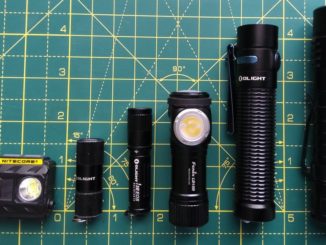In my previous article I explained how switching to a low-carb diet has life-changing health benefits.
It’s been several months since I started a keto diet (very low-carb), so I thought I’d give Puffins an update on my progress. I’ll also go into more detail on some specific topics and share my personal medical data, in the interests of science.
Recap of Part 1
In Part 1, we discussed how the problem with traditional weight-loss diets is the flawed “eat less, exercise more” mantra. Here are the main points:
- The diet industry’s focus on measuring calories in and out ignores the importance of the hormone insulin, and how the different macronutrients – carbohydrate, protein and fat – affect our bodies in different ways.
- A standard reduced-calorie diet is extremely hard to maintain because it creates deprivation. Even if dieters successfully lose weight, they will usually regain the weight and extra when they stop the diet.
- Standard diets also mistakenly assume cutting fat (which is higher in calories) is the way to go.
- A low-carb, high-fat diet, in contrast, produces a metabolic change in your body. When you are lacking carbs, your insulin levels drop and within a few days you become ‘fat adapted’ – your body switches from burning glucose for energy to burning fat.
High insulin caused from eating carbs stops all of the body’s mechanisms for fat burning. - Exercising more without addressing the problem of high insulin does not help weight loss. In fact, it will make the feelings of deprivation worse. This is why you see fat people jogging without success – their bodies are not burning fat.
- More importantly though, high insulin causes insulin resistance and metabolic syndrome, which are associated with most of our modern-day health problems.
- So, switching to a low-carb high-fat diet lowers insulin, enables fat burning, and brings significant other health benefits.
Update on Results
I’ve stuck to my keto diet for 16 weeks and have also incorporated some intermittent fasting. I currently weigh 85kg/187lbs, down from a high of 102kgs/225lbs. This means I’ve gone from obese to normal on my BMI. I’ve not done any extra exercise – I’ve only changed what I eat. As you can see from the graph below, I’ve seen a steady reduction in weight and body fat, which I’ve measured using some intelligent scales. (You can also see the week two ‘blip’ that often happens with keto. This is due to initial water loss being regained.) The scales also show an approximate reduction of 2kgs in visceral fat around my organs (each extra kilogram of visceral fat doubles a male’s chance of getting type 2 diabetes).
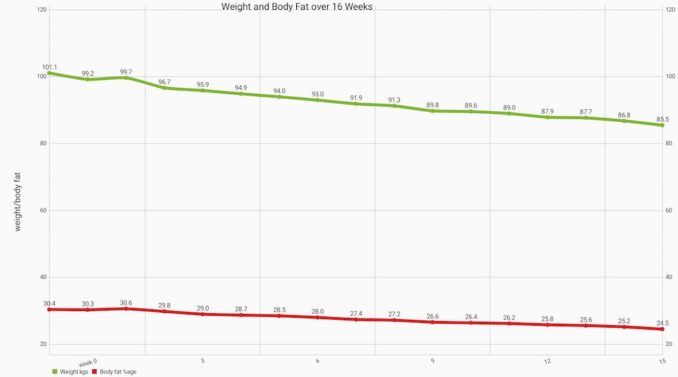
© JimmySP, Going Postal 2021
Cholesterol
I’ve just had my periodic work medical examination, so I’ve been able to compare my blood results to three years ago. You can see the key stats from the doctor’s reports in the following table.
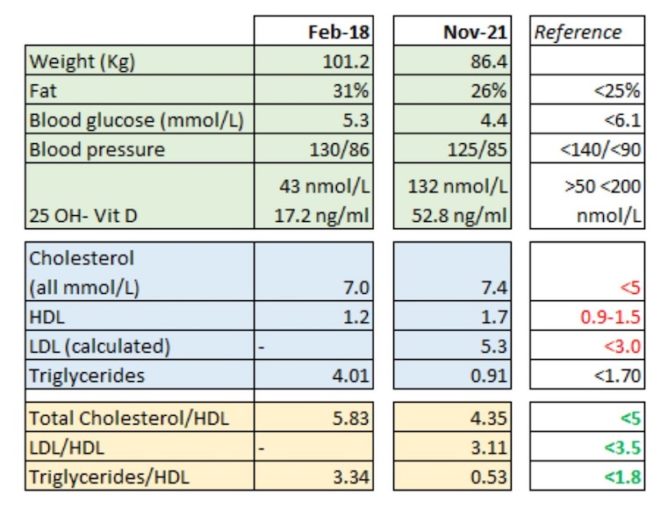
© JimmySP, Going Postal 2021
The key ones I was interested in related to cholesterol.
Cholesterol is a molecule made by the body in order to build and repair cell walls. It is essential to life. HDL and LDL are carriers which transport cholesterol around. Some people have genetic problems resulting in extremely high levels, but for most people the body regulates all this. Triglycerides are a type of fat molecule which you can consume or make in your liver. High triglycerides in the blood indicate high fat in the bloodstream, which is not good. Counter-intuitively this actually comes from eating high carbs rather than high fat, as my own results prove.
In 2018, I was told I had ‘high’ total cholesterol, and high triglycerides. My triglycerides were so high in fact that my LDL “bad cholesterol” level could not be calculated. At the time I cut down on high-fat foods, as advised, and sure enough my figures ‘improved’ a few months later. (The NHS being the NHS my local GP surgery just read my figures out over the phone, so I can’t remember exactly what they were). In November 2021 though, despite losing lots of weight, it appeared all of my cholesterol figures were still out of the UK acceptable reference ranges, although my triglycerides had plummeted. My doctor advised the following in his report:
Your blood test results indicate overall good health with the exception of your cholesterol reading which is high. This is accompanied by a high proportion of the LDL fraction of cholesterol which is thought to be significant in terms of future increased cardiovascular risk. It is therefore very important you look at your diet in general and reduce your cholesterol-containing foods…the remainder of your blood tests are entirely satisfactory.
What is going on? Is my Keto diet going to clog up my arteries? Should I follow my doctor’s advice?
Well, I’ve put the UK reference ranges in the table in red because after doing my own research I’ve discovered they are actually very poor measures of whether you should be worried. This gets quite complicated, but the simple version is that total cholesterol is not a good indicator, and thinking of LDL as “bad” cholesterol is also incorrect. Ratios are in fact much better indicators of whether you could be at risk of arterial inflammation. Total triglycerides is also a good indicator. I’ve put reference ranges for these ratios in green based on the research I’ve done. For a fuller explanation, I recommend the YouTube videos on cholesterol from Ivor Cummins, Dr Sten Ekberg and Dr Paul Mason.
When considered this way, my figures were in fact looking good, consistent with my other improved metrics. The medical orthodoxy however, suggests that I’ve got a serious problem of too much cholesterol. I should cut out saturated fats and have a balanced diet (i.e. start eating more carbs again), or I will eventually need drugs to force my cholesterol down.
Many doctors think that the incorrect interpretation of cholesterol by mainstream medicine is one of the biggest scandals in modern medicine, putting people on expensive and counterproductive drugs.
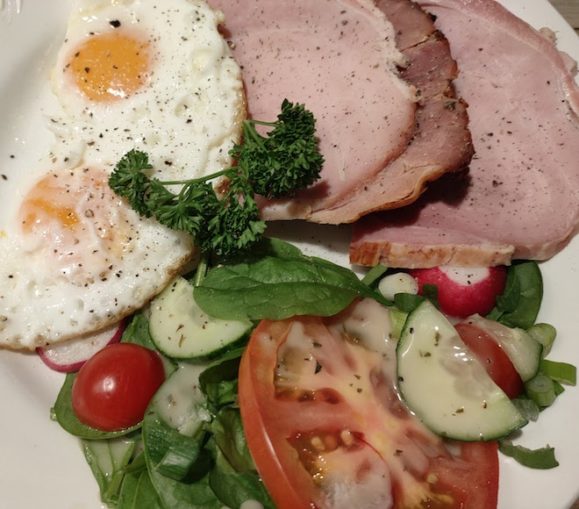
© JimmySP, Going Postal 2021
The Biggest Surprise – Keto is Easy
People who have commented on my weight loss have assumed that I must be suffering in order to lose weight. The reality is that it has been remarkably easy. Just as a hidden force compelled me to reach for the biscuit tin, now a hidden force seemingly compels me to resist such food. It really is quite bizarre. The obvious conclusion that I have reached is that low-carb diets work and all others don’t.
Simply put, the main cause of weight gain is a habit of eating too many carbs and therefore the only sustainable solution is breaking this habit.
The most revelatory thing about keto is how it suppresses hunger. Hunger is caused by changes to insulin levels, which for most people will be due to carb withdrawal. If you break free of the carb-insulin merry-go-round, you just don’t get as hungry. In 1965, Angus Barbieri, a Scottish obese man, went 382 days without eating. He didn’t starve to death or give up from unbearable hunger because he escaped his carb addiction and became fat-adapted. He therefore successfully burnt his huge fat reserves for energy. Not getting hungry also makes intermittent fasting easier. I’ve often gone 24 hours without eating because I’ve been busy and forgotten to eat. My body has not reminded me to eat because it has plenty of stored fat to burn.
As well as losing weight and not experiencing cravings, I have found that my energy levels are much more consistent throughout the day. I don’t have the same tiredness I used to feel. I’m more productive as I find myself just getting on with tasks rather than putting them off. I also find it easier to fall asleep at night, and my teeth are cleaner.
An interlude on vitamins
There’s been quite a few comments on GP recently about what vitamin supplements are best to take. This topic is a minefield, so I’ll just share what I do. I take a tablespoon of cod liver oil each day, an additional 4000 IUs of ‘vitamin’ D3 and magnesium and zinc supplements. This seems to have paid off as my Vit D levels are now at a high level when previously I was deficient. However, the more I’ve learnt, the more reluctant I am to take tablets when I can eat real food instead. For example, a single pepper will give you enough daily vitamin C, whereas a tablet will just give you the ‘non-complex’ version of vitamin C – ascorbic acid. If you want to prioritise, it seems the most important supplement to take is cod liver oil. This is because unless you live in a Greek fishing village, omega 3s will likely be lacking in your diet. cod liver oil also contains D3.
Is Keto for me?
Everyone is unique, and what works for one person to maintain health, or the ideal weight, will be different for another. We all have different physiologies and starting points, and many people will have specific conditions that need to be considered. (This is why government guidance on diet is such a terrible one-size fits all approach – just as it is with vaccinations).
My adventures in keto have been as much about learning how my body responds to food and exercise as it has been about learning the science of it. My wife eats a low-carb diet, but is not Keto because she finds herself getting too skinny. That said, from all I have read, low-carb, and especially Keto, appear to be something of a universal miracle medicine for fixing weight problems, many diseases, and generally promoting good health. Many doctors claim that it can have benefits in preventing and managing some cancers. Evidence for the cardiovascular benefits, linked to its mechanism of lowering insulin, are already proven. The world is slowly catching up to the science of low-carb.
Measuring Ketones
For someone on a keto diet, a good way to learn what works for you – and what you can get away with – is by measuring how many ketones your body is producing.
Under a sufficiently low-carb diet – usually less than 50g of carbs per day – your body becomes fat-adapted and you will enter a state of ketosis. This means that you will start making molecules called ketones within your liver, which will then be used for energy. This is the aim of a Keto diet because it demonstrates a physiological switch from burning glucose from carbs to using fat for energy. Ketone production is the unique feature of the Keto, Atkins and Paleo diets. Researchers have only recently started to understand the effects of ketones. The health benefits of being powered by ketones rather than glucose appear to be significant. Ketones have been called the fourth macronutrient. Benefits are being discovered to brain health and the treatment of dementia. US special forces have even been experimenting with moving their soldiers onto keto to improve performance. Ketosis is actually how we start life; babies are born in ketosis and the high fat in mother’s milk keeps them in it for their early development.
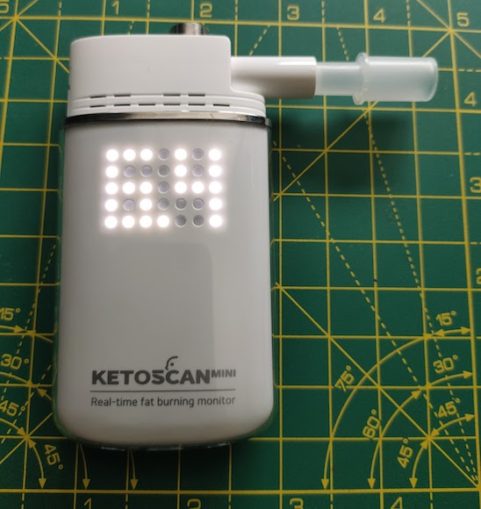
© JimmySP, Going Postal 2021
Your level of ketones can be measured in your urine, blood and breath. When your liver metabolizes circulating free fatty acids, these acids are transformed into acetyl‐CoA, a molecule used in the production of energy. If you have low glucose levels this is used to produce β‐hydroxybutyrate (BOHB) and acetone. These are all ketone bodies. BOHB can be measured in the blood whilst acetone, because of its small size, diffuses into the air spaces of the lung and appears in the exhaled breath. Breath acetone concentration (BrAce) has been shown to correlate with the rate of fat loss in healthy individuals. It also inversely correlates to blood sugar levels. This makes measuring BrAce using a high-quality breathalyser the best way to get a current picture of your level of ketosis.
I bought the Ketoscan mini. It connects to an app but also displays your BrAce in parts per million (ppm) in a dot matrix display. I’ve been taking readings a couple of times each day to confirm I’m still in ketosis, and seeing how my diet affects the readings. What I’ve found is that it’s easy for me to maintain ketosis on my current diet. I got some very high readings earlier in my diet, but I have now settled at around 5 ppm most of the time – a ‘reliable’ level of fat burning. I’ve learnt that I can get away with a few glasses of dry wine and still be in ketosis the next day. I also found that most takeaway food drops my ketones, probably because of hidden sugars. Stress also seems to drop it, whilst fasting increases it.
In summary, if you are a bit of a techno-geek, getting a ketone breathalyser is interesting and fun. It is a lot easier than urine strips or pricking your finger to test your blood (it is also more accurate because it directly measures current fat burning). I did a few tests to assess how accurate my Ketoscan is. Doing repeat blows produced within 10% of the same reading and trying it on non-keto people also showed no/very low ketones. So it appears accurate. I paid £150 on eBay for mine. Best to avoid the cheaper Chinese made breathalysers though as these get poor reviews. My model also requires sending off for re-calibration every 300 uses and annually, so there is a recurring cost.
Red Pills and Globalist Group-think
One thing that has struck me recently is just how fat so many people appear. Even those who don’t look obese will often be fat around the middle – a warning sign for insulin resistance and metabolic syndrome. I wonder how much worse this has become since lockdown. I was encouraged to change my diet after I found myself grazing on biscuits whilst working from home. It is only logical that when humans are deprived of seeking pleasure from normal activities they will make up for it in other areas. Carb satiation is probably the nation’s number one pleasure activity. When you add in increased stress from pandemic fear and staying indoors, which reduces vitamin D3 production, it seems the approach from the government during the pandemic was the exact opposite of what was needed for a robust immune system. I am willing to bet that multiples more people will die prematurely just from the bad habits established during lockdown compared to even the highest estimates of lives saved by lockdown.

Maggie De Block, Belgian Minister of Health,
EU2016 NL – Licence CC BY-SA 2.0
The benefits of low-carb could therefore be a massive red pilling opportunity for normies. When you see for yourself the undeniable benefits of a low-carb diet, and the harms of the alternative, or of even following your own doctor’s advice – you realise we are being lied to on a massive scale.
I’ll go back to the NHS guidance on nutrition.
Base meals on higher fibre starchy foods like potatoes, bread, rice or pasta…eat some fish, eggs, meat..choose unsaturated oils and spreads, and eat them in small amounts…choose lean cuts of meat and skinless poultry whenever possible to cut down on fat.
The “5 a day” recommendation also includes high fructose fruit and fruit juices. I’ve been doing the exact opposite. This guidance is global. If you do an internet search for national dietary guidelines for any random country you will find essentially the same advice. What is so frustrating is the benefit of low-carb is not new knowledge. Mainstream medicine a hundred years ago prescribed it for treating diabetes and epilepsy. Just as in other domains, we have forgotten the wisdom of previous generations and have been brainwashed by a new set of experts working in cahoots with governments and corporations.
If people realised that the globalist-groupthink on something as fundamental as food is harmful, they would be more likely to question “the experts” on everything.
© JimmySP 2021


